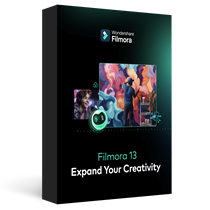The use of AI has extended the bounds of basic media generation. There are various AI models which have been introduced and adapted by people. This large-scale adoption clearly indicates how people have been utilizing this innovation. Stability AI is an open-source AI-generative company that produces AI models. During the adoption, a community induced the AI model and provided it in a ready-to-use format.
Replicate Stability AI provides a direct experience of image-generative AI. This community is based on providing comprehensive APIs to users for easy utility of AI models. In this article, we will consider Replicate’s Stability AI and discuss how it is changing the image creation market amongst other players.
In this article
Complentment to Stability AI to turn your creativity into real scenes and edit them effortlessly with AI.

Part 1: A Comparison Stretched Between Midjourney and Stable Diffusion
Multiple generative AI models are used to create professional images. Stable Diffusion, being one of them, presents itself as an essential player in the market. However, there are other options that you can opt for when looking to create images. Instead of Replicate’s Stable Diffusion AI, you can also go for Midjourney.

Midjourney is another impressive AI-generative tool that provides image-generation options. There are some significant underlying differences between Midjourney and Stable Diffusion. As a new user of AI, you need to be aware of these differences to determine the best option. Provided next is a tabular comparison between Midjourney and Stable Diffusion:
| Midjourney | Stable Diffusion | |
| Ease of Accessibility | By this date, Midjourney can only be accessed through Discord. There is no other option available to access Midjourney. | Multiple tools have adopted the AI Stable Diffusion model. Such availability has influenced the easy usage of the AI model. |
| Overall Image Quality | It provides some high-quality results when prompted. The issues arise when the prompts are not fully understood. | With properly specified prompts, getting results with Stable Diffusion AI models is easy. |
| Image Management Options | Turning to the editing options, you can find multiple options in Midjourney. To improve overall results, you can create better prompts. | While the model trains on its own data, it provides high-quality images. These images can also be edited with different options, as per the tool's offering. |
| Overall Prompting | To prompt in Midjourney, you need to learn the right ways. Different symbols are used to specify creation. | The prompting procedure in Midjourney is very simple. Beginners can also make use of these tools with ease. |
| Pricing | Allows generating at least 200 images for $10. | Allows generating 1500 images for $20. Also available for free as source code. |
| Code Availability | The service is available as a proprietary machine-learning model. | Stable Diffusion is available as source code for free. |
| Custom Model Support | Midjourney includes a few custom model options to improve user experience. | There are thousands of custom models available for Stable Diffusion. |
Part 2: What Is Replicate's Stability AI and How Is It Used?
Stable Diffusion is available through different tools, as stated before. Though you can access the image generation ability from any appropriate tool, there is one good option. Replicate Stability AI offers a unique image generation option through stable diffusion.
This latent text-to-image diffusion model helps generate realistic images. With simple inputs, you can achieve high-quality results with Replicate’s model. Provided next is the proper step-by-step procedure to use Replicate’s Stability AI:
Step 1. When accessing Replicate’s Stability AI API, ensure you are in the “Playground” section. As you find yourselves in this section, provide a prompt in the required section.

Step 2. Continue to define the “Height” and “Width” of the image from the available drop-down menus. You can select any appropriate value that stands as a multiple of 64. If you have to add any negative prompt, add the details of the objects in the required section. Continue defining the number of outputs you want to find in the results.

Step 3. Add other generative settings that you need to set for the AI image generation. Once you define all options and settings, click “Run” to generate an image from stable diffusion. The generated image can be shared or downloaded using suitable options.

Bonus Part. A Creative Video Innovation With Top AI Models
While the image generation industry has been introduced with major innovations, it is not the limit. The developments brought by AI are replicating across various media formats, including videos. Video making has been improved with the introduction of different AI models. This section intends to discuss 2 case studies that have genuinely influenced video-making with AI:
1.Sora by OpenAI
OpenAI recently developed the innovation of Sora, which offers video generation options. You can access the AI functionality using prompts and create the right high-quality video. Sora is influenced by diffusion models and thus presents high-quality results. While it starts generating videos with noisy outputs, the transformation models synthesize the overall results.

2.Wondershare Filmora
Wondershare Filmora is another leading player in the video generation industry. Primarily known for its video editing abilities, Filmora offers generation options. It has a dedicated AI text-to-video option, which helps create high-quality videos. Furthermore, it provides the option of creating images of the highest order with its AI Image feature. This innovative platform offers various options for managing audio, videos, and images.

Conclusion
The article above clearly explains how stable diffusion leads to the image generation market. With its integration with Replicate’s community, the Replicate Stability AI provides utility to many users. Along with understanding the major operations of this process, this article has also explained how the ripples have extended across the video-generating industry.



 100% Security Verified | No Subscription Required | No Malware
100% Security Verified | No Subscription Required | No Malware


